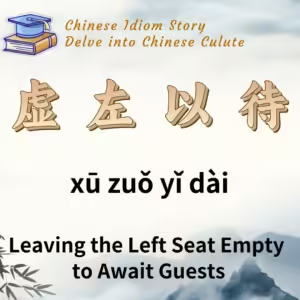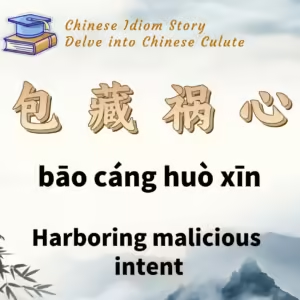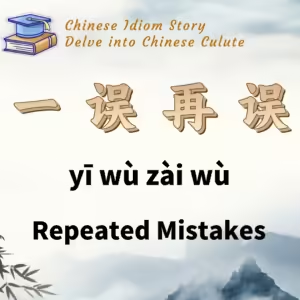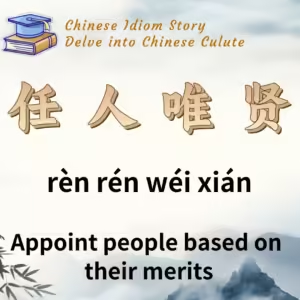
Chinese Idiom: 虚左以待 (Xu Zuo Yi Dai)
English Translation: Leaving the Left Seat Empty to Await Guests
pīn yīn: xū zuǒ yǐ dài
Idiom Meaning: This idiom signifies leaving a position or seat empty to show respect to guests. The term “虚” (xū) means “empty,” and “左” (zuǒ) refers to the left side, which was traditionally regarded as the honored position in ancient China.
Historical Source: This idiom comes from “Shiji: Wei Gongzi Liezhuan” (《史记·魏公子列传》).
Idiom Story:
Wei Gongzi Wuji was the youngest son of King Zhao of Wei, the fifth king of the State of Wei during the Warring States period. After King An’ao ascended the throne, he conferred upon Wuji the title of Lord of Xinfeng (信陵君), a title associated with a city in present-day Nengling County, Henan Province.
At the end of the Warring States period, there were four renowned and hospitable lords: Lord Mengchang of Qi, Lord Xinfeng of Wei, Lord Pingyuan of Zhao, and Lord Chunshen of Chu. Among them, Lord Xinfeng was most famous for his humility and respect toward his guests. His entourage was diverse, consisting of butchers, gatekeepers, gamblers, and tavern owners. Despite his higher status, he treated everyone equally with respect, regardless of their background or abilities.
Lord Xinfeng was exceptionally sincere and humble towards his guests, who in turn were willing to go to great lengths for him. Once, while playing chess with King Wei, a signal fire arose from the northern border indicating an invasion from Zhao. King Wei quickly set aside the chess pieces and summoned his ministers to discuss strategies. However, Lord Xinfeng intervened, saying, “The King of Zhao is out hunting, not invading.” They resumed their game, and soon reports confirmed that the King of Zhao was indeed hunting, not attacking Wei.
King Wei, surprised, asked Lord Xinfeng how he knew this so accurately. Lord Xinfeng replied, “I have guests who can gather intelligence about the King of Zhao; they often inform me of his activities.” This led King Wei to grow suspicious of Lord Xinfeng, feeling unable to entrust the state’s major affairs to him.
Lord Xinfeng’s successful rescue of Zhao was largely due to the support of his guests, Hou Ying and Zhu Hai, who risked their lives for him. This loyalty was a result of the extreme humility and sincerity with which he treated them.
The historical account describes how Lord Xinfeng sought out the recluse Hou Ying, who was seventy years old, poor, and worked as a gatekeeper at the eastern gate of Daliang. When Lord Xinfeng heard of him, he visited with the intention of offering a generous gift. Hou Ying declined, stating, “I have cultivated my character for decades; how could I accept money from you simply because I am in a poor position?”
In response, Lord Xinfeng held a banquet for guests. After they were seated, he led his carriage, leaving the left seat empty to welcome Hou Ying. After slightly adjusting his tattered attire, Hou Ying climbed aboard and sat in the honored left position, testing whether Lord Xinfeng’s humility was genuine. At that moment, Lord Xinfeng held the reins with even greater respect.
However, Hou Ying felt the tests were not sufficient. After getting into the carriage, he insisted on stopping to visit a friend, Zhu Hai, in the bustling market. Lord Xinfeng drove him there, waiting patiently while Hou Ying chatted endlessly with his friends. Meanwhile, many ministers and nobles were waiting for Lord Xinfeng to join them for a toast, and the citizens were puzzled to see him serving a poor old man. Even his guards were growing impatient, murmuring about the old man’s worthlessness. Yet, Lord Xinfeng remained unwavering in his humble demeanor.
After Hou Ying finally said goodbye to his friends and returned to Lord Xinfeng’s residence, Lord Xinfeng seated him in the honored position and praised him in front of all the guests, personally offering him a toast. After these trials, Hou Ying recognized Lord Xinfeng as a noble person of high virtue who was genuinely humble, and he willingly decided to follow him.






